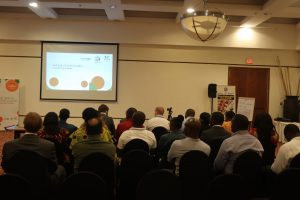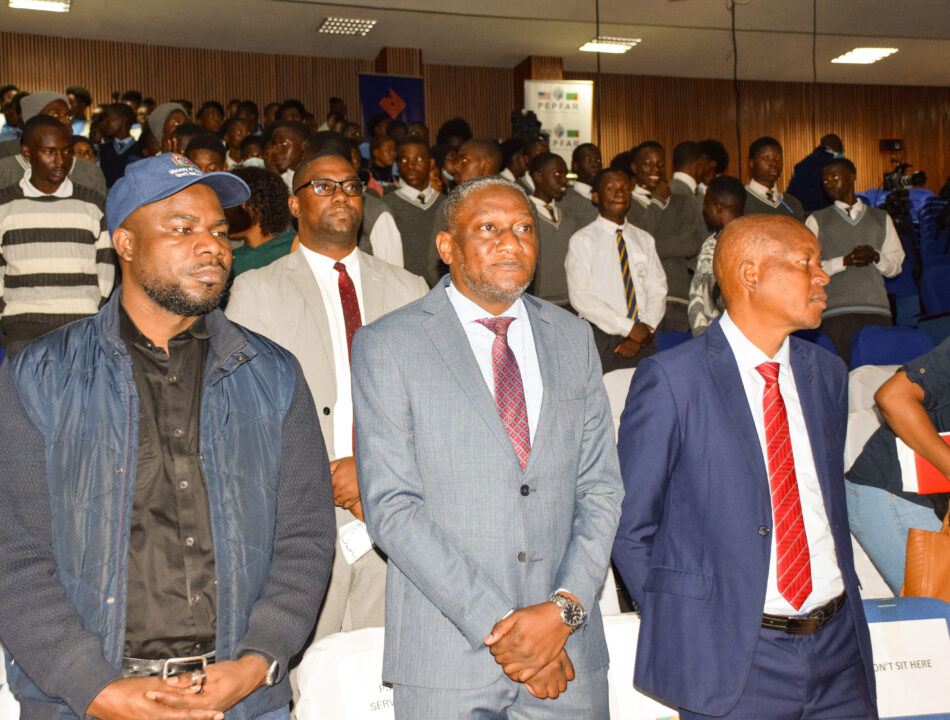
CIDRZ Coordinator Elected as Chair of SANOP Steering Committee
March 26, 2020 Geneva, Switzerland & Lusaka, Zambia – 3 February 2020 – The Foundation for Innovative New Diagnostics (FIND) and the Zambia National Public Health Institute (ZNPHI) announced today the launch of the Zambia One Health Surveillance Platform for Antimicrobial Resistance, developed in collaboration with Blue Frontier and the eSHIFT Partner Network (eSHIFT). The platform was launched during a special event organized on the sidelines of the 3-day Pan-Africa Workshop on Effective Implementation of a National Action Plan on Antimicrobial Resistance, in Lusaka, Zambia, 22–24 January 2020. The workshop itself was organized by the Antimicrobial Resistance Coordination Committee (AMRCC) through ZNPHI, under the country’s health ministry, and the Centre for Science and Environment (CSE), a non-profit based in New Delhi, India.
Geneva, Switzerland & Lusaka, Zambia – 3 February 2020 – The Foundation for Innovative New Diagnostics (FIND) and the Zambia National Public Health Institute (ZNPHI) announced today the launch of the Zambia One Health Surveillance Platform for Antimicrobial Resistance, developed in collaboration with Blue Frontier and the eSHIFT Partner Network (eSHIFT). The platform was launched during a special event organized on the sidelines of the 3-day Pan-Africa Workshop on Effective Implementation of a National Action Plan on Antimicrobial Resistance, in Lusaka, Zambia, 22–24 January 2020. The workshop itself was organized by the Antimicrobial Resistance Coordination Committee (AMRCC) through ZNPHI, under the country’s health ministry, and the Centre for Science and Environment (CSE), a non-profit based in New Delhi, India.
Antimicrobial resistance (AMR) develops when microorganisms (such as bacteria, viruses and some parasites) evolve to stop antimicrobial treatments (including antibiotics, antivirals and antimalarial drugs) from working. As a result, essential treatments become ineffective. AMR, particularly antibiotic resistance, is a global public health threat known to impact healthcare, food safety, nutrition security, livelihood and the attainment of several UN Sustainable Development Goals. The World Health Organization (WHO) has identified AMR as one of the 12 global health challenges in 2020.1
‘One Health’ is an approach to designing and implementing programmes, policies, legislation and research in which multiple sectors communicate and work together to achieve better public health outcomes. In Zambia, the One Health Surveillance Platform aims to improve data collection, analysis and data quality in laboratories and different sectors of the Zambian economy, through creation of connected surveillance tools that track and map the emergence of resistance, form the basis of national surveillance programmes, and enable the Zambian government to make data-driven decisions. The platform was designed to ensure burden-free implementation for health workers, no new data silos, and long-term sustainability.
1 World Health Organization. Urgent health challenges for the next decade. 13 January 2020. https://www.who.int/newsroom/photo-story/photo-story-detail/urgent-health-challenges-for-the-next-decade (accessed 27 January 2020)
Additionally, the One Health surveillance platform enables each sector (human, animal, etc.) to have an intra-sectoral view of resistance patterns while also enabling a collated, comprehensive view of One Health surveillance data at a national level.
Speaking at the launch event, Dr Victor Mukonka, Director ZNPHI/Chairman AMRCC, commented that Zambia has long recognized the critical need for timely, relevant and reliable health data to support evidence-based decision making. He said: “As a nation, we have a number of already established data sources but have until now lacked a systematic approach towards the collection and analysis of this data for effective and meaningful decisions. It is therefore gratifying to note that we are the first country to put in place this interoperable One Health data management system that will help capture reliable data, which is critical to inform how we as a country can carry out actionable steps to address the growing threat of AMR”.
Catharina Boehme, CEO of FIND, said: “Effective use of data at local, regional and global levels is key to tackling AMR. This platform will enable improved, automated surveillance that can inform decisionmaking and enable proactive responses to AMR-related threats at a local level, as well as feeding into national strategies and implementation programmes. Further, it lays the foundations for interconnected data systems that could improve disease surveillance beyond AMR – to identify and monitor outbreaks, for example – and enhance clinical care.”
This project is supported by the UK Department of Health and Social Care’s Global AMR Innovation Fund (GAMRIF). GAMRIF is an Official Development Assistance (ODA) fund which allocates funding for projects that promote the welfare and economic development of low- and middle-income countries (LMICs). GAMRIF’s funding supports FIND’s work to enhance the impact of diagnostic tools for AMR, to support improved AMR surveillance and antibiotic stewardship.
Dame Sally Davies, UK Special Envoy on Antimicrobial Resistance, said: “Addressing the rising number of drug-resistant infections requires global action if we are to successfully contain and control the threat AMR poses to modern medicine, food security, animal welfare and the economy and achieve the UN’s Sustainable Development Goals in these areas. We need more data on how antibiotics are used in both humans and animals to fully understand the scale of the threat of AMR. But we still do not have robust AMR surveillance systems in over 50% of African countries. This platform represents an exciting opportunity to improve surveillance in Zambia so we that we can develop sustainable strategies to control it. I’m delighted that the work we are supporting FIND to do through this project directly complements other UK Aid investments in Zambia, including through the Fleming Fund and Public Health England’s activities to strengthen Zambia’s capacity in epidemic preparedness.”
Dr Nathan Bakyaita, WHO Country Representative for Zambia, said: “WHO is committed to ensuring safe, efficacious antimicrobials, based on the organization’s vision of a world in which all people attain the highest possible level of health, with a mission to promote health, keep the world safe and serve the vulnerable. Since 2015, the World Health Organization has supported the Global Antimicrobial Surveillance System (GLASS) in support of the Global Action Plan on AMR. The objective of GLASS is to support global surveillance and research to strengthen the evidence base on AMR and help inform decision-making. GLASS provides a standardized approach to the collection, analysis, and sharing of AMR data, which includes epidemiological, clinical, and microbiological data and, since 2019, includes data on antimicrobial consumption. In 2020, eighty-seven (87) countries including, Zambia have been enrolled in GLASS. We are happy that Zambia has taken a step to develop a one health data management system that will make it even easier to submit AMR data to GLASS.”
James Fry, Managing Director of Blue Frontier, said: “The opportunity to work on this project is extraordinary for us – it is this work that our team finds most motivating and rewarding. It has been great to work with our partners, FIND and eSHIFT, and we are proud to be able to introduce our new, open source, inter-operability platform ‘Open Interop’ as part of our commitment to support low-cost, sustainable, healthcare solutions.”
Steven Uggowitzer, President, eSHIFT Partner Network, said: “eSHIFT is proud to have partnered with FIND and Blue Frontier on this groundbreaking project. By using best-in-class engineering to meet the data collection and analysis challenges of AMR we were able to create truly robust systems for Zambia which we hope can then by leveraged by other countries facing the same challenges, and turn into a global good.”
Following the launch event, at least four other countries in Africa have expressed interest in implementing a similar AMR surveillance system.
About FIND
FIND is a global non-profit organization that drives innovation in the development and delivery of diagnostics to combat major diseases affecting the world’s poorest populations. Our work bridges R&D to access, overcoming scientific barriers to technology development; generating evidence for regulators and policy-makers; addressing market failures; and enabling accelerated uptake and access to diagnostics in low- and middle-income countries (LMICs). Since 2003, we have been instrumental in the development of 24 new diagnostic tools used in 150 LMICs. Over 50 million FIND-supported products have been provided to our target markets since the start of 2015. A WHO Collaborating Centre, we work with more than 200 academic, industry, governmental, and civil society partners worldwide, on over 70 active projects that cross six priority disease areas. FIND is committed to a future in which diagnostics underpin treatment decisions and provide the foundation for disease surveillance, control and prevention. For more information, please visit www.finddx.org
About ZNPHI
The Zambia National Public Health Institute (ZNPHI) a technical arm under the Ministry of Health, is a public health center of excellence that addresses all major public health concerns in Zambia. ZNPHI seeks to improve health of all Zambians through coordinating priority public health and health security activities and resources; leveraging strong partnerships at the international, national, and sub-national levels; generating and analyzing scientific evidence for advocacy, policies and programs; and prioritizing public health functions. It serves as the Secretariat to the national AMRCC and is responsible for coordinating the implementation of Zambia’s Multi-sectoral National Action Plan on Antimicrobial Resistance. For more information, please visit http://znphi.co.zm/
About the One Health Surveillance Platform
The One Health Surveillance Platform is one part of an emerging managed distribution of software and services, called AoS Health. AoS Health is an orchestrated suite of tools and services capable of data collection, interoperability between internal and existing client systems, as well as data analytics and warehousing. All of the different elements of the platform come together in a ready-to-use hardware (Pandora), thereby abstracting the technological complexities and empowering national health systems leaders and healthcare providers to build best-in-class data management systems quickly. This enables the development of data-led programmes to improve health outcomes in their communities.
Media contacts:
FIND: Sarah-Jane Loveday, Head of Communications T: +41 (0) 22 710 27 88
M: +41 (0) 79 431 62 44 media@finddx.org
AMRCC/ ZNPHI: Kapona Otridah, AMR National Focal Point & Coordinator +260-977-969539 Mazyanga LM Liwewe, Head Communication, Information and Research +260-977-879400 editor.healthpress@znphi.co.zm





5 Comments
I just love reading through as well as browsing your blog. Its full of data that I may use. Thanks a bunch!
excellent issues altogether, you just gained a new reader.
What might you suggest about your put up that you simply made a
few days ago? Any certain?
I found your web page from bing and it is excellent. Thankx for providing such an informative post!!!! Baby Car Beds
I’ve been surfing online more than 2 hours today, yet I never found any interesting article like yours.
It is pretty worth enough for me. In my view, if all webmasters and bloggers made good content as you did, the net will be much more useful than ever before.
ive checked this cool site a few times now and i have to say that i find it quite good actually. continue doing what youre doing! 😉